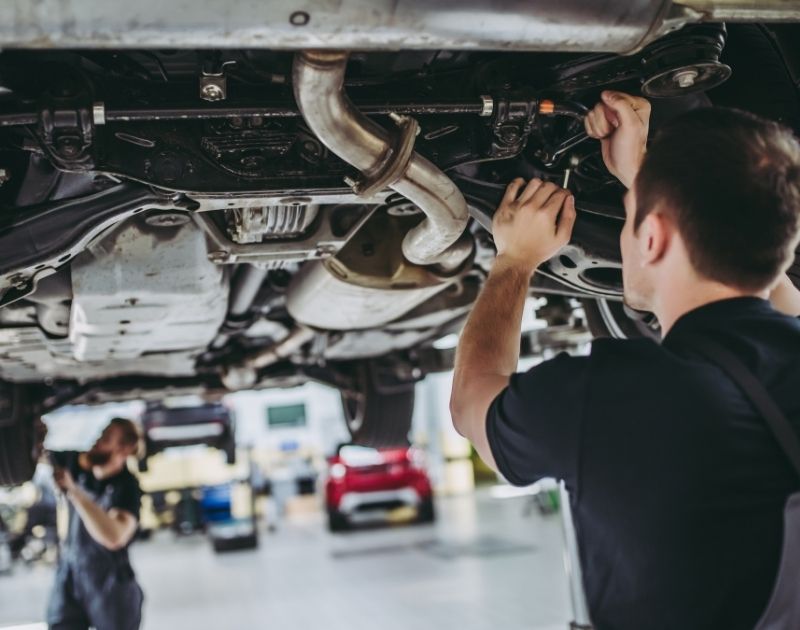Financial Questions to Ask When Buying a Car
10 Questions to Ask Before You Buy a Car
April 10, 2020
Spread the Knowledge. Share: 
 Maybe your car broke down and you were late to work again, or you feel it's just time for an upgrade. Whatever the reason for deciding to purchase a new vehicle, you'll need to do your research. There are a variety of things you should understand before making a decision, such as car dealerships, trade-ins, auto loans, etc. The best way to make sure you understand the process is to ask questions along the way. Read on and make sure you know these 10 questions to ask when buying a new car.
Maybe your car broke down and you were late to work again, or you feel it's just time for an upgrade. Whatever the reason for deciding to purchase a new vehicle, you'll need to do your research. There are a variety of things you should understand before making a decision, such as car dealerships, trade-ins, auto loans, etc. The best way to make sure you understand the process is to ask questions along the way. Read on and make sure you know these 10 questions to ask when buying a new car.
1. What are my car financing options?
Whether the car is new or used, understanding your finances is the first step to any car purchase. You need to look into what you realistically can and cannot afford. Before you even think about applying for an auto loan, you need to consider how much you can afford to put down and how much you can spend in terms of a monthly payment. Don't forget that you will need to consider insurance costs, maintenance costs, warranty costs, and any other automotive related expenses that may occur.
If you are in good financial standing, you can talk about your options with an auto lender to understand what type of price range you are working with and what is an optimal monthly payment plan for you. Checking your finances before buying a car will also help you figure out ways you can make improvements to your credit score and savings.
2. What is the difference between a loan and a lease?
Similar to understanding your finances before buying a car, it is essential to understand the difference between a lease and a loan. Leasing a vehicle means that you're making payments for a fixed period of time at an agreed amount of money; the agreed amount of money is less than the full price of the car. It's similar to renting in the sense that at the end of your lease, you don't own the car.
Second, a car loan means that you own the car and are making payments for a fixed period of time until the price of the car is repaid in full. Both options are viable for different situations. You should consult a financial advisor or lender to discuss which option works best for your needs.
3. How does my credit score affect buying a car?
A credit score is a three digit number assigned to each person with a credit history. This number indicates your ability to repay a loan to lenders. Various factors go into determining what your credit score is, such as payment history, type of credit, and more.
Credit matters when you are a car buyer because most people aren't able to afford the total cost of buying a car out of pocket. This means you would need to get approved for a loan by a bank or a credit union. If you prefer a good interest rate or a loan amount that covers the entire cost of the card, it will require a good credit score. Your credit score can also affect the type of auto insurance rates you can qualify for. Overall, having a good credit score can help you get approved for a loan, help qualify you for lower interest rates, and potentially receive lower car interest rates.
 4. What factors should I consider when deciding which car to buy?
4. What factors should I consider when deciding which car to buy?
Besides the financial aspect of purchasing a vehicle, deciding the make and model of the car you want to buy may be a challenging task. There are many different things you can consider when it comes to choosing the perfect match. You may consider characteristics, such as size, miles per gallon, safety ratings, specific features, and more. Other logistical factors to take into account are how many passengers you carry and how long your daily commute is.
Research the types of cars you are considering and look into what they have to offer. If the model you're interested in has a bad service record, like a history of recalls and frequent repairs, it may be time to start looking into a different type of car. Evaluate your options and find a car that is going to suit your needs while fitting within your budget.
5. Why is comparing car deals important?
Once you know the type of vehicle you're in the market for, you can begin to shop around to see what local dealerships offer. You may be able to find more than one of the same kind of car in your area; however, you want to find the best vehicle for the best price. Some car dealers may offer exclusive deals and warranties that other businesses may not.
Once you compare and contrast each of the dealerships and the prices they can offer you, it may be wise to check with a private party. There tend to be a few more risks when purchasing a vehicle from a private party, but sometimes you can find a great deal. After a plethora of research, you should be able to locate the best deal for you whether it's buying a brand new car at the local dealership down the street or the pre-owned vehicle from your neighbor, Betty.
6. Should I trade-in my old car?
If you're looking to trade in your vehicle, figure out what your car is worth before speaking with a salesperson. Knowing your car's worth will help you understand the type of offer you should be receiving from a dealership. Do some research online to find your car's estimated trade-in value at a trusted site like Kelley Blue Book.
Once you get an estimate of what your car is worth, you can be more knowledgeable about trading-in your vehicle. You could also attempt to sell the car on a private sale. This will require more effort, but it could mean getting more money for your used ride. Consider your options and decide which choice will give you the most peace of mind.
7. Why is it important to know a car's history?
There are many questions to ask when buying a used car. In fact, there might be more car questions to ask about a used car than buying a new car. This is because there may have been multiple owners, a history of accidents, a notice of a factory recall, or other specific incidents that are unique to the make or model of the car.
Before making the final purchase, you need to make sure to ask for a vehicle history report to know the full breakdown of the car's past. You also may want to check online for any recalls made in the recent past. If the seller doesn't want to provide the vehicle's history, it may not be the best idea to purchase from them. Even if you buy a car from a person you know, such as a neighbor, friend, or family member, you should be aware of all the facts about the vehicle.
8. Why should I test drive a car before buying?
When trying to decide which vehicle you would like to buy, you should always test drive a few options. Test driving will help you determine if this car is the right match. For example, does the car ride smoothly? Is it comfortable for you to ride in? Are there blind spots? Is there anything else that you may not like?
At first sight, you may have completely fallen in love with a car; however, when you start driving it, it may not be what you expected. Even little features that seem insignificant when looking at the vehicle, may turn into a large inconvenience if you buy the car without testing it out first. Additionally, if you happen to be buying a used car, really pay attention to how the vehicle operates when you're conducting your test drive.
 9. Should I get a second opinion?
9. Should I get a second opinion?
When purchasing a car, it is always a good idea to get a second opinion on the condition of the car. This could give you an idea on what maintenance will be like in the long term. If you have a mechanic that you trust, you should ask them to look it over. Taking the vehicle to a mechanic may cost a fee; however, it could save you a lot of money in the long run. There is a lot more to consider than just the purchase price of the car.
It's better to be safe than sorry when it comes to purchasing a car. Sure, the price of the car may be attractive, but maintenance and repairs on the car could cost a fortune. If the seller refuses to let you get a second opinion, there may be an underlying issue they're hiding.
10. What other types of questions should I ask when buying a car?
Before purchasing a vehicle, it's important to ask the right questions to understand what type of vehicle you are buying. Below are some great questions to ask the salesperson or private seller before you purchase your new ride.
- Does it come with an extended warranty?
- What are some common repairs?
- Are there any additional hidden fees?
- What is the gas mileage?
- How many total miles are on the car?
- What amenities does the vehicle come with?
- Can I take the vehicle to my mechanic for an inspection?
- Can you trade-in my vehicle?
- What is the vehicle owner history?
- How well has the car been maintained?
- If buying from an individual, why are they selling?
After you consider all of these questions, you will be in a great position to purchase your new vehicle. As you know, buying a car is pretty much the same as any major purchase; you want to make sure you do a good job with the research and inspection, so that later down the road you aren't regretting your purchase. With the help of these tips, you can make the car-buying process fun and effective. Soon enough you'll be riding down the street in a new (or new to you) vehicle.
Financial Questions to Ask When Buying a Car
Source: https://students.1fbusa.com/adulthood101/questions-to-ask-before-you-buy-a-car

0 Response to "Financial Questions to Ask When Buying a Car"
Post a Comment